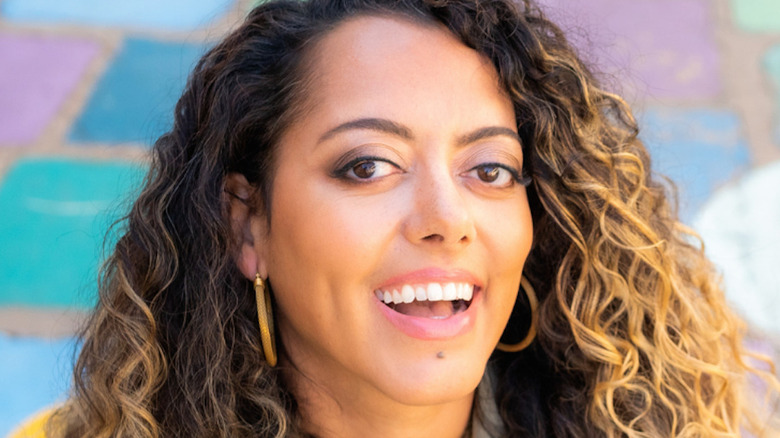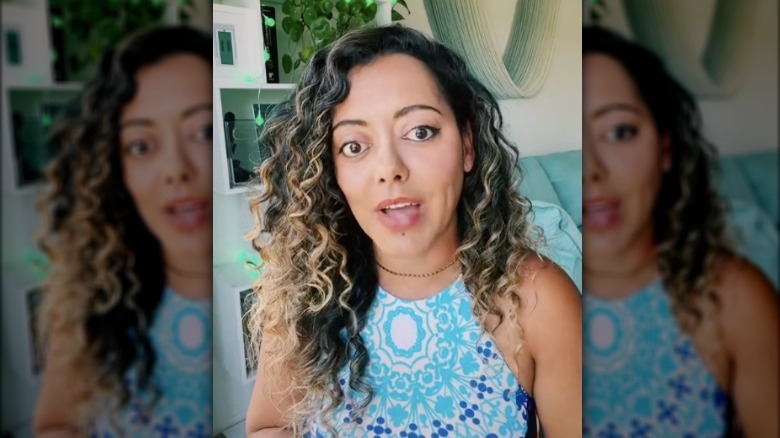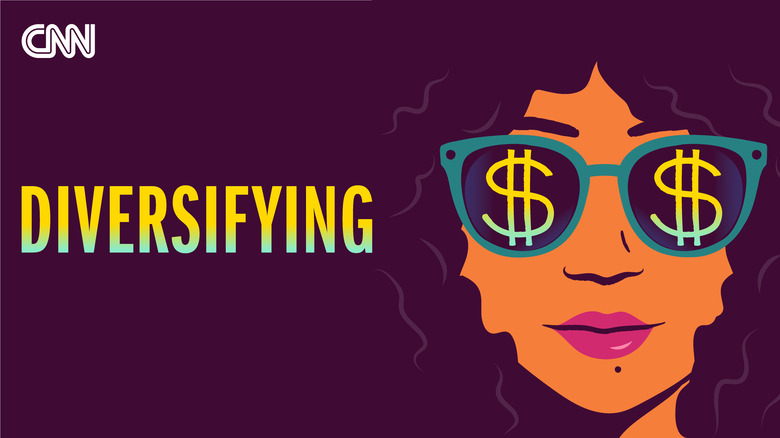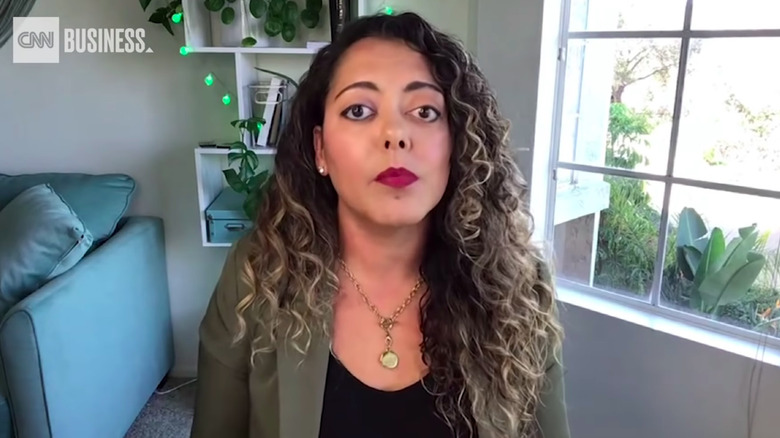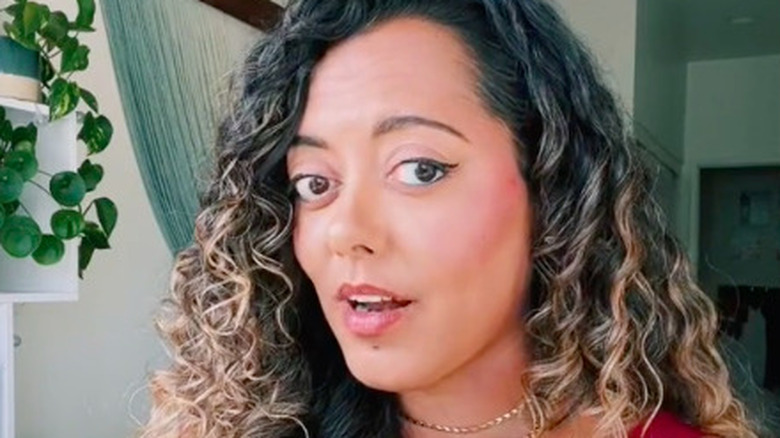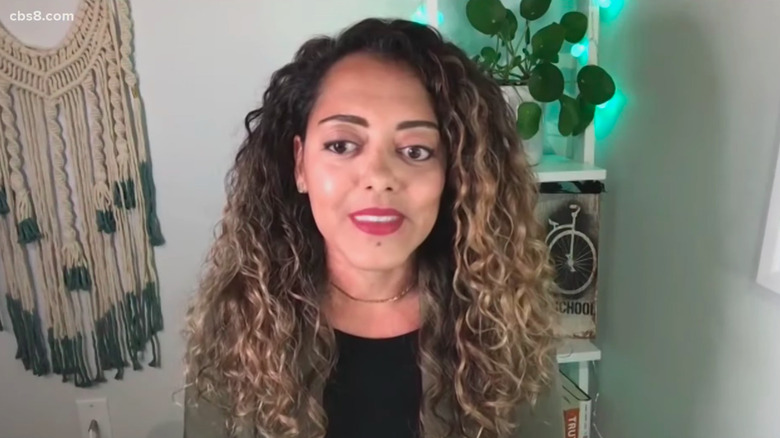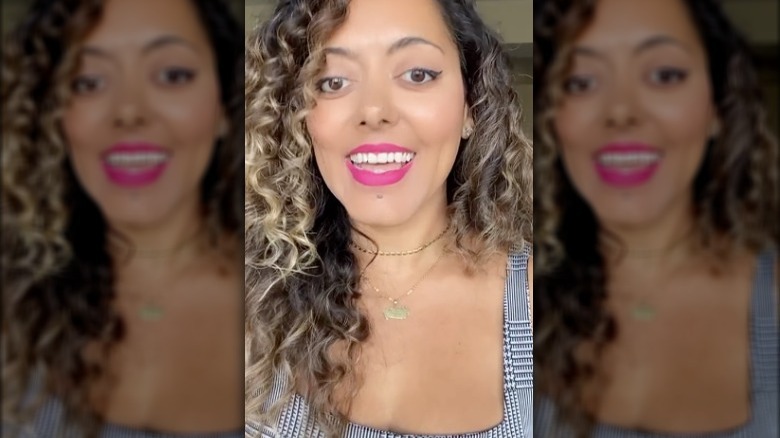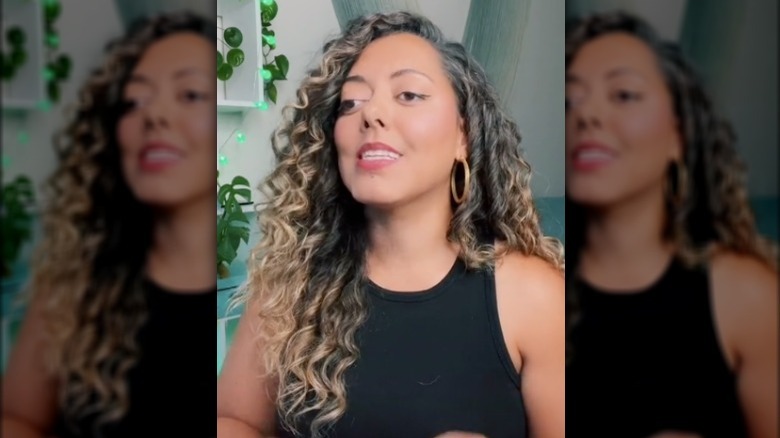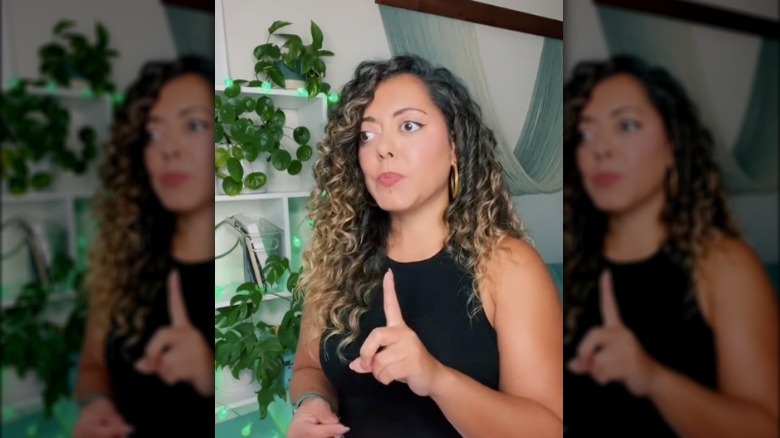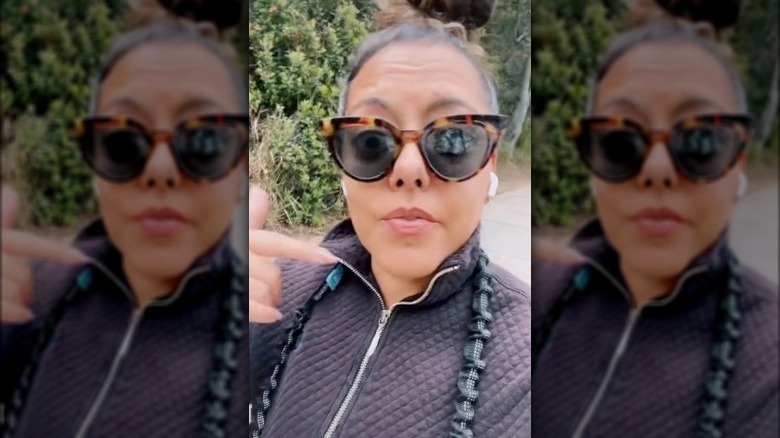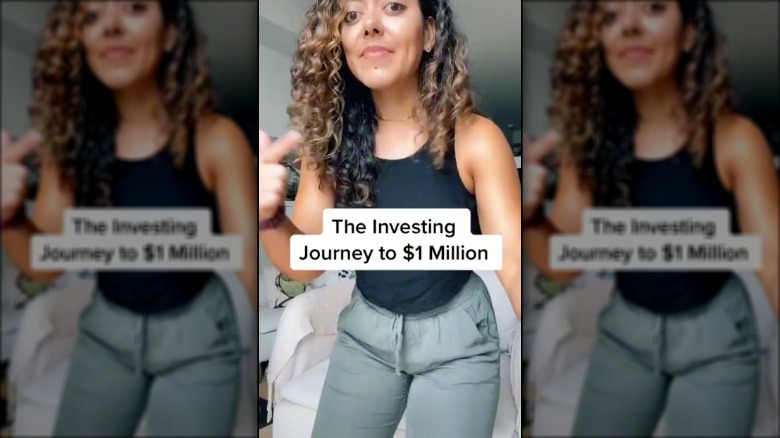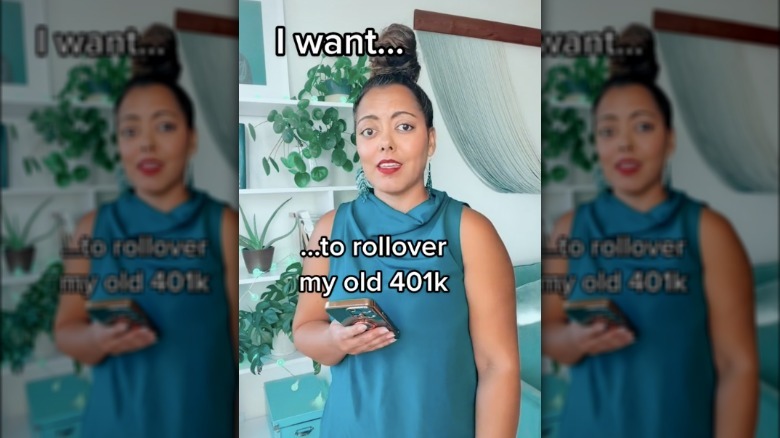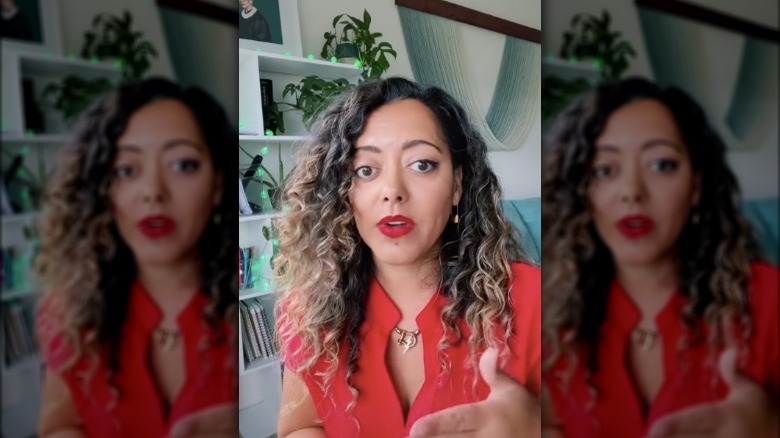Delyanne Barros Gets Real About Your Money On CNN's Diversifying - Exclusive Interview
Delyanne Barros didn't come from wealth, and she had to work hard to get herself through college and law school. After achieving her goals and landing her dream job as an attorney, Barros was still six figures in debt from school and feeling miserable in her work. "I was overworked, uninspired, and stressed all the time," she wrote on her website.
So, at 37, Barros made a shift. She didn't know much about investing outside of her 401K, but she learned, made a plan to pay off her loans, and started investing in the stock market. Now, she's debt-free and on track to retire by age 45. After all the success she found in learning to invest her money wisely, Barros wanted to share that knowledge. She began giving financial advice on TikTok and Instagram. So many people were interested in what she had to say that Barros was able to quit her job as an attorney and run Delyanne the Money Coach LLC full-time.
She's recently taken another big step by starting a finance podcast, "Diversifying," with CNN. Like her other platforms, Barros uses the podcast to share financial knowledge and offer different routes to financial independence. In an exclusive interview with The List, the money expert shared her experience working with CNN and why she's hopeful the podcast can be a welcoming space.
Her experience starting her podcast
What's it been like for you to start this podcast?
Oh my goodness, it's been an incredible journey to see the whole podcast coming to life from zero to where it is now. I've really been involved since we've started developing it, and that's what was so unique about this process is that I got to be involved right from the beginning, and I get to weigh in on what we talk about, which guests we bring on, how we shape the episodes, and I work with this incredible team at CNN. It's been an incredible opportunity, and I've gotten to talk to some of the people that I admired for so long, for so many years, and now I get to talk to them on the podcast, and it's been an incredible experience.
How has starting the podcast compared to other social media and the different ways that you've shared this information in the past?
I've only been doing short-form social media with my posts on Instagram or TikTok or Reels. This is a much deeper dive into different topics that I usually touch on in social media. That's the beauty of doing a podcast — you can dive a little deeper, you can give some of the nuance, because you're always missing the nuance in social media. People think that you can fit everything about a topic in a 60-second TikTok, and there is so much more to say about this. [These short posts are] so you have an idea that this topic exists.
To be able to sit down with people who are experiencing these kinds of issues, with experts, with all these different people from walks of life and talk about it on a much deeper level gives these subjects the attention that they deserve. It gives people the opportunity to really feel heard and seen in a different way than in a quick little snippet, 30-second Reel. You're not going to be able to capture all of the intricacies and human emotions that go into personal finance the way that you can on a podcast.
Did she have any anxiety starting Diversifying?
Was there any intimidation when you first went into making that longer-form content or were you more excited?
I was definitely excited. I was intimidated because it's CNN. It's such a big name. It's such a big platform. I'm like, "What does this mean?" It's one thing to have your protected little community on Instagram, but then I'm like, "Oh my God, I'm going to be exposed to this much bigger audience." It's been phenomenal. I've gotten only positive feedback about the podcast. People have really resonated with it. It's trending really well on all of these charts. It's one of the top business podcasts out there, and I'm super happy with it.
The reviews that have come in have been super positive. Mostly, it was blending my style with CNN, but it's been a pretty seamless transition. Any fears that I had when I first started have been quashed since we've dove into the process.
Why she leads with empathy
With your show and across your career, you've always made a point of opening up the conversation to women of color and other minorities. Why do you feel like those groups are frequently left out of personal finance conversations?
If you look around the personal finance space, you're going to see that we are very much a minority in the space. That's why CNN wanted to launch this kind of podcast because they wanted to provide a platform for people who have been left out of the conversation, and specifically, it's been women and people of color.
Why is that important? Because there is so much nuance to personal finance. There are so many issues that we all face when it comes to money, but there are going to be other historical factors, and cultural factors that specifically apply to women and people of color. You can't talk about money and not talk about the gender wage gap and not talk about the racial wealth gap. You can't talk about money and not talk about discrimination. Those things are all intertwined.
Coming into this podcast, that was something that I was very clear about. We need to talk about these issues hand in hand. We can't just be telling people, "Save and budget and invest," and not talk about all of the context that's around money because that's just one side of the story. Frankly, that's what the personal finance community has been doing for ages. That's what the financial industry has been doing for ages, and people are tired of it. They don't see themselves in those stories. They don't connect. And because of that, it's hurting them financially.
I'm trying to bridge that gap by showing them, "Hey, I see you. I hear you. I am like you, too, and we can learn these concepts together in a way that showcases empathy." That's what I try to lead with is empathy at all times. How would somebody be feeling if they were on the other end of this? I try to put myself in their shoes, and I think that's what's missing in a lot of personal finance content — empathy for other people.
How listeners are reacting to the podcast
With the CNN podcast opening you up to a new audience, what has the reaction been like for people seeing that side of it who maybe haven't been able to hear that when they've talked about or heard about finance in the past?
People are really surprised in a good way that CNN has taken this project on. It was very unexpected, bringing somebody from outside of CNN. I'm not one of their reporters. I'm not coming from inside the company. They went outside the company. They specifically wanted somebody of color to come and represent people. That was a phenomenal move on their part, and they're really putting their money where their mouth is with it. It's surprised people in a great way.
Like I said, people have been really reacting to the podcast in a positive way. They are loving the topics that we've chosen, the guests that we're showcasing, and the fact that we play voicemails from our listeners. It's almost like a little bit of an extended version of the stuff I post on my Instagram. It gives people a little bit more meat to bite into, and it's still fun. That's what's important, too. It's still fun. It's not this dry, boring podcast. We try to make it fun. We try to make it relevant to what's going on in the news. All of that together has made it a really powerful platform that is only going to continue to grow and attract more people.
She wants to show people they're not alone
What topics are important to you to bring into the conversation to include more people?
We started out the podcast talking about student loans, but we didn't just want to talk about, "Hey, here's how you pay off your student loans." We really wanted to show why student loans have become such a huge problem. Why are we in this situation? What has led us here? How has it impacted, again, women and people of color? What would forgiveness mean for those people? We dig deeper into the topics. Right out of the gate, we were like, "Hey, we're going to talk about this big topic that is on everybody's mind, but we're also going to do it in a way where we're not going to sweep things under the rug. We're going to talk about all the issues that led us to this moment."
That's one big topic. Another one that's coming out soon is we're doing an episode all about money trauma, which is huge and very rarely spoken about in the personal finance space, because many people haven't made that connection yet — there's a lot of psychology going on behind our decisions with money. This isn't just people who are choosing to be in debt and choosing to be broke and choosing to have struggles with money. A lot of this is connected to our psychology and things that we've experienced earlier in life.
Talking about money trauma and how that relates to financial success is something [where] I was like, "We have to talk about this topic," especially when it comes to minority communities. Being Latina, coming from a home where parents were divorced, went through financial struggles, lost it all, I had to step in as a pseudo parent to help them out, [and] I knew how much that played into my psychology. I knew I couldn't be the only one. I'm not that unfortunate or that special that anything is just me.
You watch TikTok, and you're like, "I have no unique experiences in life." Every TikTok I watch, I'm like, "Oh, that's me too." I always think it's just me, and I'm like, "It turns out it's millions of people." That's what we're trying to capture with this podcast, that "Oh, that's me too" moment of, "It's not just me. I'm not alone." I've gotten so many of those messages from people where they're like, "I thought I was struggling with this alone. I thought I was a loser. I thought I was broken because I couldn't figure this out." I'm like, "No, it's not just you." There's also this major system out there that is a cause of all of these issues, and we're all trapped in it. We're all trying to navigate it the best way that we can.
Why considering 'money trauma' is important
It's funny that you mentioned money trauma because that was literally my next question. On your show, you've already touched on that a little bit. Can you explain what that is and why it's important for someone to understand how that might be affecting them?
I always include a trigger warning whenever I'm talking about money trauma because you never know if people are ready to deal with that issue. We interviewed a person that went through money trauma that was in the form of domestic violence in their childhood. They will share their story from their perspective on that and how that has impacted them in their adult life when they're dealing with money. A lot of people will have a lot of light bulb moments in that situation because they're going to be like, "Wow, I went through something similar, and I didn't realize how my money decisions were being impacted by something like that."
We're still cave people. Our brains still operate like we're cavemen, and we want to be safe, and we want to be fed, and we want to have shelter, the very basic needs. A lot of us are still struggling to get those basic needs met, and that's all tied to money and how we relate to money. We talk about therapy. We talk about how therapy is incredibly important and how there's a lot of stigma, still. In this day and age, there is still so much stigma around therapy and how financial therapy is part of that. That episode, I'm super proud of, and it will make a huge impact.
How to get out of living paycheck to paycheck
As you said, there are lots of people who are like, "I'm still trying to figure out how to get to next month, much less saving money for the future." If someone's interested in becoming more financially independent but they don't know where to start, what advice do you usually give in that situation?
When people are living, for instance, paycheck to paycheck, there are only two ways to go there. I hate being so binary, but there are only two ways to get yourself out of that situation. One is to cut your expenses, [and the other is to] increase your income. A lot of people will lean towards the cutting of expenses at first, thinking that this is a much easier route. This is much more doable for me. You can do it up to a certain point, but you get to a point where you're living in so much scarcity. You feel like you're living to work. You're like, "I can't spend on any of the things I love. I can't do any of the things I love. Why do I have this job? Why did I go to school and get this job if all I'm doing is paying bills all the time? I can't take a vacation, can't do this, can't do that."
Then, you're in fear of losing your job all the time. You're stuck in this cycle of scarcity. You can only cut so much before things get really dire. There's the other option of like, "Oh, I can increase my income," which is easier said than done. There are challenges on that side, too. There's the Great Resignation, which has allowed a lot of people to pivot and make more money, but that's not true of all industries. Some industries have definitely been able to take advantage of this more than others.
You can try to negotiate your salary. We also did an episode on negotiations, which is one of our most popular episodes. People absolutely love that. That's important because, even though I'm a business owner and I started my business as a side hustle, I don't think that's the path for everyone. You can literally side hustle your way to burnout. [Not] everybody needs to side hustle their way.
Increasing your income
I like to show different options. I'm like, "Hey, if you don't want to side hustle, cool. Let's talk about increasing your salary. Let's talk about pivoting to a different industry. Let's keep the conversation going." If somebody's living where they're feeling very strapped, the first thing we need to do is look at your finances as they stand. Right now, how much are you bringing in? How much is going out, and where do you want to pull the levers? Do you want to pull the lever on the side of, "I should cut some expenses," or do you want to pull the levers on, "You know what? I can actually be doing X, Y, and Z to increase my income."
You're going to be pulling those levers throughout your life at different rates. That's the conversation that I try to have with people instead of being hardcore [about], "Hey, you have to do X, Y, and Z. If you don't do it this way, then you're a loser, and you're doing it the wrong way." That's not the way to speak to people.
Finding your financial goal
What do you feel is the biggest concern or the hurdle that people have to get over, mentally, before they're ready to start working out how they want to shift their mindset?
You have to start with your goal in mind, which sounds like something out of a self-help book, but it's so true. What is the goal here? Money has a lot of parallels with the dieting industry. Are you trying to lose weight so you can squeeze into a dress, so that you can impress your friends, so that you can look a certain way like a celebrity? What's the intention behind your actions? We can reverse engineer it, because if your [reason] is to impress other people, you're not going to be very motivated for very long. You're going to soon realize that's not sustainable, and it doesn't make you happy, and you did all of this work for nothing.
First of all, what is your why? What's the endpoint here? Why do you want to save money? Why do you want to invest? Why do you want to pay off this debt? Let's get to the hardcore question of why. What does your dream life look like? I'm not talking about, "Yeah, of course, I wish I had a hundred million dollars, and I could travel all over the world and never work again." Me too. I'm talking about realistically, in the world that you're living in right now, what is your dream life like? What does your day look like? When you get up, what do you do? What are you spending money on? What are the things that truly bring you joy?
A lot of us will spend time scrolling online, mind-numbing scrolling, and then purchasing things that we didn't even want. I've been there. I've gotten packages at home from Amazon, and I'm like, "Why did I order this?" It's really getting to the why. Once you start realizing, "This makes me happy, and that is why I want it. Money will help me get closer to that." That's going to help you create a much clearer plan that's going to be true to you.
Is financial independence possible for everyone?
Do you feel like achieving financial independence is something that everyone can get to, or what's your perspective on that?
In theory, Yes. Everyone can get to financial independence in theory, but we don't live in theory. We don't live in hypotheticals. We don't live in formulas. We don't live in that world. We live in the real world, and the real world has a lot of challenges. That's why we did this podcast because I want to talk about the challenges. It's not enough to tell people, "Open a Roth IRA and put money in there, and you'll be a multi-millionaire." That's not how the world works.
Everybody can achieve it, but many won't because of those challenges. I'm trying to help as many people as I can to overcome those challenges as possible. Some challenges we're able to overcome with knowledge and teaching things, and some not so much. Some are much more complicated, but the math is there, and it can work. The math works.
[With] the way that capitalism is set up, the way that our system is set up, it's going to keep a lot of people from reaching that goal. I choose not to be pessimistic. Otherwise, what would be the point of me doing this? It's why I teach people. I know if I can at least help a percentage of people, that's better than no people. I'm hoping to inspire people, but I tell people financial independence isn't the only goal that you should be striving for. They're like, "I'm never going to be financially independent. I'm never going to be able to retire early, so what's the point?" I'm like, "Well, what if you could work less? What if, instead of working 40 to 50 hours a week, you could work 20 hours a week. That's pretty good. That's a good goal that's worth working towards."
Then they're like, "I didn't even think of that." They think it's all or nothing. It's either financial independence or work until you die. There's a lot of gray area in between. There are a lot of steps in between that you can achieve. There are levels to this. Let's focus on getting you to a better level, instead of focusing on, "That person's doing this goal, so I should pursue that too." That's not helpful.
Why finances aren't black and white
You talk a lot about tailoring your financial plan to what is important to each individual. Do you feel like there's been a tendency with a lot of financial advice to [say things like], "You have to cut down your spending by this much," and it's very black and white?
Yes. Especially, it's very gendered towards women, I feel like. Women are usually marketed to as, "Hey, you're over-spenders, and you are spending too much money at Sephora and at this and at that, and you should cut your spending." Usually, when I see marketing towards men, it's much more about building wealth and investing and starting businesses and being moguls. Men don't even call their businesses "side hustles." Have you ever heard a man use the term "side hustle"? No. They call their businesses "empires." Out of the gate, they're like, "I'm building an empire."
There's a lot of marketing at play here between men and women. I'm trying to show people, yes, there's value in budgeting. Yes, there's value in cutting back, but that's not all you should be thinking about. There's only so much you can cut, but how much you can make is unlimited. That's much more expansive. I want people to be thinking about both. You need to be thinking about both instead of just focusing on cost-cutting and couponing. That is, again, a very scarcity mentality ... It can be super helpful when you're trying to pay off debt and really power through a goal, but [in the long term], I don't suggest anybody live like that.
Picking podcast guests and topics
With your podcast, how have you been going about picking what guests you want to come on and what topics you want to cover? What's that been like for you?
We're super collaborative, our team. I have an amazing team of producers that I work with, and we have meetings once a month. We meet weekly, but we do these pitch meetings where we talk about all the different topics, and we cull from different things that are going on in the news. We are like, "Hey, this is a really fascinating topic." I get a ton of messages every day from my followers, and I see patterns. When I see a pattern that's standing out, I'm like, "Hey, a lot of people are interested in this topic. Let's talk about it."
If there's a guest doing something that [makes me think], "Wow, they've really pivoted the topic on this. They've really shown me a different way to think about this topic," then I want to bring them on the podcast and talk to them. I'm really proud of the guests that we've brought because 95% of them have been people of color. That was incredibly important to me as well, coming into the podcast, and CNN was on board with this.
We want to feature the voices that have been looked over for so many years in other personal finance spaces. I'm trying to bring in people [where it's not a case of], "You have a big following, and that's why I'm bringing you on." I've brought people who, as I said, have an interesting, unique perspective. it doesn't necessarily mean this is going to be a huge, splashy celebrity on our podcast. I try to have a real good mix of guests, and I think we've done a great job with that. I don't know how many episodes you've listened to, but I feel like the episodes that we've released so far are really broad in the sense that we cover a lot of different topics, but then we still dive deep into each one.
We've talked about everything from student loans to negotiating to marriage and divorce. I like covering both sides of different topics. We just released an episode on crypto, which is the one that always gets so much hype about. I'm like, "How am I going to find somebody to talk about crypto?" I specifically wanted a woman because, in this space, it's very male-dominated. You hardly ever see women talking about crypto. I want somebody who's going to come in here, give a very measured take on crypto, and who's a woman, and I want to hear it all. I want to hear the pros and the cons. We nailed it. The episode speaks to that.
What she hopes listeners get from Diversifying
Are there any other upcoming topics that you're really excited for people to hear?
We have the money trauma episode that's coming up, which is going to be huge. We have another episode that's also talking about labor unions, which is exciting because that's big right now with Amazon in the news. We also have a celebrity guest that I don't want to spoil, but we do have a celebrity guest that's coming out. That's going to be fun.
We are also doing an episode on money traps, different things that can trip people up in the personal finance space, [and] how people can avoid those. That was super fun. We just did it, and ... credit cards. We're going to do a series on credit cards because we're gearing towards Gen Z as well. We want to make sure that they start off strong, and credit cards are usually the thing that people trip up on. We're going to do a whole episode on that. Those are some of the things that we have in the works.
How are you hoping that this podcast can open doors or possibilities for people who haven't considered that they could go down this path and be more [in control of] their finances before?
I'm hoping that it's a fun podcast that is entertaining while it's still educating, what we now call "edutainment," which is what I've been doing with TikTok and Instagram. You got to do a little song and dance and then teach people about their Roth IRAs. I have brought that energy into the podcast. It is a fun podcast. It has heart. It talks about real issues. It talks about the human beings behind these concepts.
I'm hoping that people will feel seen, they'll feel heard in this podcast, and it's not just going to be somebody talking at them. It's going to feel like we're having a conversation, you and me. It's going to feel very personal. That's what I hope people walk away with, and that they walk away not feeling judged, that they have solutions, practical solutions that they can actually apply, but also that it's catharsis. It's cathartic to hear that other people are struggling the same way you are. Sometimes, you feel so alone. That's what I'm hoping people will get out of it. They will feel seen, they will feel a catharsis, and they will also walk away with practical tips.
You can listen to Diversifying on CNN Audio or anywhere you listen to your podcasts. New episodes drop each Monday.
